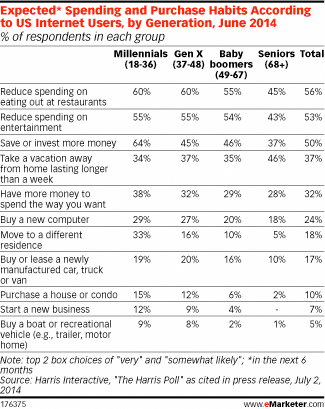Millennial Consumers: Experiences vs. Stuff Debate Rages On
October 11, 2014
![]() With tight finances, millennial-led households spend less on average than total US households. But collectively, their expenditures are large and growing, and Accenture forecast these would reach an annual $1.4 trillion by 2020, according to a new eMarketer report, “Adult Millennials as Consumers: Sifting Through the Contradictions in Their Shopping Behavior.”
With tight finances, millennial-led households spend less on average than total US households. But collectively, their expenditures are large and growing, and Accenture forecast these would reach an annual $1.4 trillion by 2020, according to a new eMarketer report, “Adult Millennials as Consumers: Sifting Through the Contradictions in Their Shopping Behavior.”
 Offering a forward-looking glimpse at spending, a June 2014 survey by Harris Interactive asked online respondents about their intentions for the following six months. A slightly above-average proportion of millennials planned to reduce outlays on entertainment and eating out. But they were also a bit above average in stating an intention to buy a computer.
Offering a forward-looking glimpse at spending, a June 2014 survey by Harris Interactive asked online respondents about their intentions for the following six months. A slightly above-average proportion of millennials planned to reduce outlays on entertainment and eating out. But they were also a bit above average in stating an intention to buy a computer.
A familiar refrain is that millennials would rather spend on experiences than on acquiring “stuff.” A related theme states that they care more about access to goods than ownership of them. A 2014 report by The Intelligence Group called young people “the first generations of NOwners, or those who prize access over ownership.”
Polling by Zipcar in December 2013 confirms a millennial bias toward experiences. Asked which is “more important for you personally,” 61% of 18- to 34-year-olds picked “experiences” over “possessions.” Then again, so did a nearly identical proportion of older respondents.
An April 2014 survey for The Rockefeller Foundation and Transportation for America queried millennials in 10 US cities on topics related to ownership vs. access. The respondents were asked how often they used “short-term rental car- and bike-share services like Zipcar, City CarShare, Citi Bike or Divvy.” Fewer than one in 10 said they did so at least a few times a month; 77% “never” did. The obvious reason why car sharing has a limited constituency even among big-city millennials is that 68% had cars of their own.
Speaking of cars: Are millennials uninterested in owning them? There was reason to think so following the financial crash of 2008 as new-car sales to millennials dwindled. But, as the findings noted above suggest, millennials did not give up on cars. Moreover, data released in May 2014 by the US Department of Labor Bureau of Labor Statistics showed households headed by 25- to 34-year-olds spending more on vehicles than Gen Xers and boomers. The wrinkle is that for millennials, a lopsided majority of this spending was for used rather than new vehicles—$2,425 vs. $1,553.
Courtesy of eMarketer




























